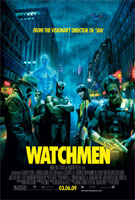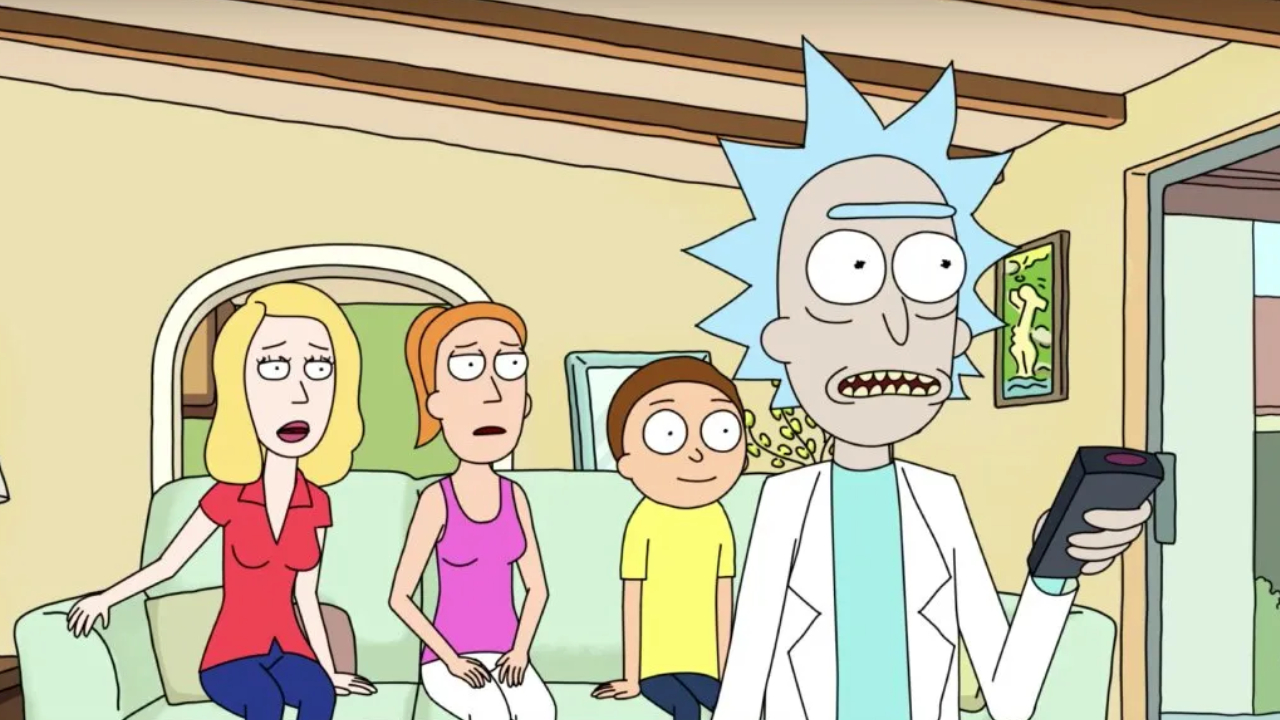There's a lot of audience excitement going into Watchmen, and not a lot of places for it to go once the movie starts. Apart from a few dark zingers from Rorschach and a handful of slo-mo high kicks, there's no real action or comedy that allows for audience release. Zack Snyder has brought us into the theater in order to contemplate dark things and big thoughts, but unlike Christopher Nolan before him, he's not throwing in a Mack truck flip to thrill us while we're there.
Of course, that was the whole point of the graphic novel Watchmen, the multilayered deconstruction of the superhero myth that was revolutionary when it was published in 1985. 24 years later, with the book's Cold War fears long since dissipated and everyone having spent last summer watching Batman repeatedly fail to catch the bad guy, the brooding central themes of Watchmen no longer really qualify as revolutionary. But to Snyder's credit, he's made a three-hour existential crisis into something snazzy and entertaining, while not nearly as meaningful as it hopes to be.
The Cold War, that global threat barely remembered by Watchmen's core audience of twenty-somethings, is the overbearing force in the movie's alternate-universe 1985, where Richard Nixon is serving his third term as President and a symbolic Doomsday Clock is set at five minutes to midnight. The only thing keeping the Soviets from nuking the U.S. is Dr. Manhattan, a real-life superman who emerged when mild-mannered physicist Jon Osterman (Billy Crudup) got trapped in a fancy-pants machine, and showed up later naked, blue and packed with muscles.
Dr. Manhattan was a game-changer not only in the nuclear arms race, but in the history of costumed heroes, real-life do-gooders who started putting on capes and masks to fight crime in the 1940s, inspired by the superheroes of comic book pages. The Minutemen of the 40s and 50s gave way to the Watchmen of the 70s, but when an act of Congress banned costumed heroes in the late 70s, all of them went into hiding.
In 1985, Dr. Manhattan lives at a research facility with girlfriend Laurie (Malin Akerman), who inherited the Silk Spectre identity from her mother (Carla Gugino). Dan Dreiberg (Patrick Wilson), once known as Nite Owl, is growing old and paunchy while haunted by images of the past, while Ozymandias (Matthew Goode) is a billionaire playboy and inventor who wears his superhero past proudly. We only meet The Comedian (Jeffrey Dean Morgan) on the night he is killed, and shortly after the sociopathic, uncompromising Rorschach (Jackie Earle Haley) investigates the murder, convinced there's a plot to kill masked heroes.
Rorschach is wrong, but the plot he and Nite Owl discover is far more complicated than can be explained here-- and given that it's the only part of the movie that differs from the book, it's the only thing that really qualifies as a spoiler. The story zigs and zags from the 1940s to 1985, from Antarctica to Mars, fleshing out the world and these characters while propelling Rorschach's investigation forward. Much of the rich source material is diluted here by necessary time constraints, and thanks to some clever snipping by screenwriters Alex Tse and David Hayter, it's not missed. Nite Owl and Silk Spectre start their tentative romance exactly as they did before. Most of Dr. Manhattan's existential angst remains intact word-for-word, and Rorschach's sociopathic narration, taken from his diary, still imbues everything with his own paranoid sense of doom.
For the most part Snyder uses his vast visual effects resources to mimic the book, from instantly recognizable individual panels to the set dressing that evokes Alan Moore and Dave Gibbons' bleak, neon-lit New York. The effects are beautiful, striking a perfect balance between this realistic world and the fantastical nature of things like Dr. Manhattan's Mars hideout, the Owl Ship, and whatever Ozymandias' pet turns out to be. Where Snyder switches things up, unfortunately, is where things start going off track. Fight scenes that were minimal, almost afterthoughts in the book become epic beatdowns, and the constant use of slo-mo camera work has the effect of making every fight scene seem like the ultimate battle. The whole point of the Watchmen is that they don't have superpowers, and most of them don't really like the violent aspect of the job, but Snyder zooms in on every broken limb or stab wound, rubbing our noses in the pain. Watchmen the book managed to share perspective with all its characters, believing equally in the Comedian's nihilism and Nite Owl's deep belief in right and wrong. Snyder's obsession with violence-- demonstrated very well in 300, of course-- makes the whole movie feel like it's coming from Rorschach's head, obsessing over the split skulls of two dogs and wondering how he can cause more pain.
The actors, perhaps as hemmed in by the book as the production is, don't get much new out of their characters, though Wilson and Morgan both plumb unlikely sympathies for Nite Owl and the Comedian. Crudup's reedy voice is a nice contrast to Dr. Manhattan's imposing strength, but he gets stuck behind the character's cold exterior and never really makes contact. Haley is a gem as Rorschach, making the little monster more enjoyable than he ever was in the books, and one-upping Christian Bale with his growly, menacing voice. Akerman and Goode are the obvious weak links, both because their characters suffer in the streamlined movie and because the actors, cast for their looks, don't have much to offer beyond them.
It's hard to feel much in Watchmen, both because of the aforementioned lack of audience catharsis-- even in a packed house, there were no real cheers-- and because the whole thing moves along at such a methodical, deliberate pace. The rambling graphic novel hasn't been given a sense of narrative drive, and even though the whole thing is building up to what might literally be the end of the world, a sense of urgency never develops. When the big bang of an ending finally does occur, the overwhelming grief that even the misanthropic Moore managed to express in the book is translated into yet another scene of a partially destroyed New York. It may as well be a deleted scene from The Day After Tomorrow.
But for the most part, the whiz-bang visuals and the genuinely interesting moral questions keep the story moving, even past deadly long speeches and unnecessary sex scenes (did we really need so many Patrick Wilson ass shots?) Nothing in Watchmen makes a compelling argument for having turned the book into a movie to begin with, but if it had to be done, this effort is probably as good as it was going to get.
Staff Writer at CinemaBlend












